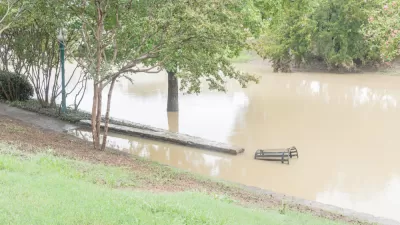We should have seen the historic flooding in the Florida Parishes region of Louisiana coming—both in preparation and in response—says a pair of recent articles.

Craig E. Colton, professor of Geography at the Louisiana State University, pens an article for The Conversation about recent floods in Louisiana. After listing off the damage wreaked by historic rainfall totals, Colton compares and contrasts with an obvious predecessor:
Reports of flooding in Louisiana may conjure up images of Hurricane Katrina, but these rivers are completely separated from the Mississippi River, and these floods posed no threat to New Orleans. Nonetheless, based on my experience studying risk and resilience in this region, I see parallels between the damage of current flooding and the damage caused by Katrina.
According to Colton, human decisions of planning and permitting exacerbated the consequences of this weather event. These areas "had experienced repeat floods, and agencies had failed to complete projects designed to mitigate flood damage before the storms hit."
According to Colton, the Florida Parishes region is a natural laboratory for flood studies. Despite a long track record of flooding, and planning efforts meant to prepare for more, but Colton says that suburban sprawl has nonetheless been allowed to spill onto the floodplain.
While Colton's concern is planning and preparation, a separate Associated Press article notes scathing reviews for the performance of the Federal Emergency Management Agency (FEMA) in the region. U.S. Rep. John Mica (R-FL), who chairs a subcommittee with jurisdiction over FEMA, called the response "pitiful." Mica argues that FEMA needs more flexibility in its programs.
FULL STORY: Suburban sprawl and poor preparation worsened flood damage in Louisiana

Maui's Vacation Rental Debate Turns Ugly
Verbal attacks, misinformation campaigns and fistfights plague a high-stakes debate to convert thousands of vacation rentals into long-term housing.

Planetizen Federal Action Tracker
A weekly monitor of how Trump’s orders and actions are impacting planners and planning in America.

In Urban Planning, AI Prompting Could be the New Design Thinking
Creativity has long been key to great urban design. What if we see AI as our new creative partner?

Pedestrian Deaths Drop, Remain Twice as High as in 2009
Fatalities declined by 4 percent in 2024, but the U.S. is still nowhere close to ‘Vision Zero.’

King County Supportive Housing Program Offers Hope for Unhoused Residents
The county is taking a ‘Housing First’ approach that prioritizes getting people into housing, then offering wraparound supportive services.

Researchers Use AI to Get Clearer Picture of US Housing
Analysts are using artificial intelligence to supercharge their research by allowing them to comb through data faster. Though these AI tools can be error prone, they save time and housing researchers are optimistic about the future.
Urban Design for Planners 1: Software Tools
This six-course series explores essential urban design concepts using open source software and equips planners with the tools they need to participate fully in the urban design process.
Planning for Universal Design
Learn the tools for implementing Universal Design in planning regulations.
planning NEXT
Appalachian Highlands Housing Partners
Mpact (founded as Rail~Volution)
City of Camden Redevelopment Agency
City of Astoria
City of Portland
City of Laramie





























